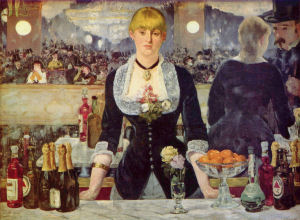That’s “A Bar at the Folies-Bergère” by Édouard Manet. I spent a bit of time thinking about it recently because of a cut-and-paste error.
It started when the guys over at SFFAudio pointed out that the podcasts of UCSD lectures are available for a limited time. Their intention was to direct us to quickly grab the MP3s (before the were cycled out) of lectures in a science fiction as world literature course.
 Except, that they had a cut and paste error, so the podcast they initially liked to was actually for an Art History course. I didn’t notice this while I was downloading the episodes, and in fact didn’t find out until I started listening to the first MP3. While I didn’t find the science fiction literature stuff I was expecting, I found a really, really interesting Art History course–with a lecturer who provided both interesting content and a dynamic and appealing delivery of that material. The lecturer, Norman Bryson, does an excellent job of bringing the material to life, particularly considering that we’re dealing with a non-visual presentation of what is essentially visual material.
Except, that they had a cut and paste error, so the podcast they initially liked to was actually for an Art History course. I didn’t notice this while I was downloading the episodes, and in fact didn’t find out until I started listening to the first MP3. While I didn’t find the science fiction literature stuff I was expecting, I found a really, really interesting Art History course–with a lecturer who provided both interesting content and a dynamic and appealing delivery of that material. The lecturer, Norman Bryson, does an excellent job of bringing the material to life, particularly considering that we’re dealing with a non-visual presentation of what is essentially visual material.
The good news here is that if you’re listening to this at a computer, you have access to a wealth of images and additional analysis of almost any reasonably well-known piece.
So, for example, when he speaks of A Bar at the Folies-Bergère, I can be looking closely at a very high resolution image while he’s talking. Nice. (As an aside, this particular image is really making me think of Eddie Campbell‘s book this year, The Amazing Remarkable Monsieur Leotard–particularly the legs on the trapeze in the upper left.)
I don’t know when I’ll get around to listening to that SF literature course, but I’ve been eating up the Art History one. Cool. I’d tell you all to go get it, but of course both courses are cycled away now. There are, however, lots of other interesting ones for this cycle up at the UCSD site–the one about the neuroscience of drugs, the culture and literature one, and maybe some more economics, all appeal immediately.



1 comment for “Happy Accidents”